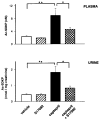Prolyl oligopeptidase is involved in release of the antifibrotic peptide Ac-SDKP
- PMID: 15037553
- PMCID: PMC4677773
- DOI: 10.1161/01.HYP.0000126172.01673.84
Prolyl oligopeptidase is involved in release of the antifibrotic peptide Ac-SDKP
Abstract
N-acetyl-seryl-aspartyl-lysyl-proline (Ac-SDKP) is a ubiquitous tetrapeptide hydrolyzed almost exclusively by angiotensin-converting enzyme (ACE). Chronic treatment with Ac-SDKP decreases cardiac and renal fibrosis and inflammatory cell infiltration in hypertensive rats. However, very little is known about endogenous synthesis of Ac-SDKP, except that thymosin-beta4 may be the most likely precursor. Two enzymes are potentially able to release Ac-SDKP from thymosin-beta4: prolyl oligopeptidase (POP) and endoproteinase asp-N. POP is widely present and active in several tissues and biological fluids, whereas endoproteinase asp-N appears to be lacking in mammals. Therefore, we hypothesized that POP is the main enzyme involved in synthesizing the antifibrotic peptide Ac-SDKP. We investigated in vitro and in vivo production of Ac-SDKP. Using kidney cortex homogenates, we observed that Ac-SDKP was generated in a time-dependent manner in the presence of exogenous thymosin-beta4, and this generation was significantly inhibited by several POP inhibitors (POPi), Z-prolyl-prolinal, Fmoc-prolyl-pyrrolidine-2-nitrile, and S17092. Long-term administration of S17092 in rats significantly decreased endogenous levels of Ac-SDKP in the plasma (from 1.76+/-0.2 to 1.01+/-0.1 nM), heart (from 2.31+/-0.21 to 0.83+/-0.09 pmol/mg protein), and kidneys (from 5.62+/-0.34 to 2.86+/-0.76 pmol/mg protein). As expected, ACE inhibitors significantly increased endogenous levels of Ac-SDKP in the plasma, heart, and kidney, whereas coadministration of POPi prevented this increase. We concluded that POP is the main enzyme responsible for synthesis of the antifibrotic peptide Ac-SDKP.
Figures





References
-
- Pradelles P, Frobert Y, Créminon C, Liozon E, Massé A, Frindel E. Negative regulator of pluripotent hematopoietic stem cell proliferation in human white blood cells and plasma as analysed by enzyme immunoassay. Biochem Biophys Res Commun. 1990;170:986–993. - PubMed
-
- Pradelles P, Frobert Y, Créminon C, Ivonine H, Frindel E. Distribution of a negative regulator of haematopoietic stem cell proliferation (AcSDKP) and thymosin β4 in mouse tissues. FEBS Lett. 1991;289:171–175. - PubMed
-
- Stephan J, Melaine N, Ezan E, Hakovirta H, Maddocks S, Toppari J, Garnier D, Wdzieczak-Bakala J, Jegou B. Source, catabolism and role of the tetrapeptide N-acetyl-ser-asp-lys-Pro within the testis. J Cell Sci. 2000;113:113–121. - PubMed
Publication types
MeSH terms
Substances
Grants and funding
LinkOut - more resources
Full Text Sources
Other Literature Sources
Molecular Biology Databases
Research Materials
Miscellaneous

